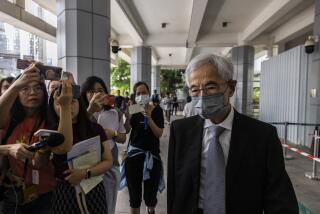China Puts 2 Well-Known Dissidents on Trial
- Share via
BEIJING — Amid tightened security and heightened speculation over the future of political reform here, China put two of its best-known dissidents on trial Thursday for “inciting subversion” through their efforts to form an opposition party to the ruling Communist regime.
The proceedings are the highest-profile political trials in the world’s most populous nation since those after the crackdown on pro-democracy protesters in Beijing’s Tiananmen Square 9 1/2 years ago.
The trials come as China celebrates 20 years of reforms that have brought economic prosperity to millions of its citizens but much less progress toward political pluralism.
The two defendants, Wang Youcai and Qin Yongmin, both veteran dissidents, are leaders in the drive to register the recently founded China Democracy Party as a counter to the Communists, who have maintained a monopoly on power in China for half a century.
Although tiny in number in a country of 1.2 billion people, supporters of the would-be opposition party have picked up steam in the past few months, attracting increasing attention from the foreign media and, ultimately, from the central government, which has mounted a roundup of the dissidents.
So far, about 30 people have been detained or questioned in the past three weeks in connection with the fledgling party, human rights groups reported.
Wang and Qin appeared before judges Thursday in separate closed-door trials in the cities of Hangzhou and Wuhan, respectively, where the two men live. The two, who were arrested last month, pleaded not guilty to charges of fomenting opposition against the government--a crime punishable by life imprisonment.
Neither man had a lawyer present on his behalf, in large part because authorities have discouraged or even bullied attorneys into refusing to accept the two men’s cases, family members and human rights groups allege.
The right to a lawyer is spelled out in China’s criminal justice code. In Wuhan, in central Hubei province, Qin’s family submitted a petition demanding that his trial be postponed because of his lack of legal representation. The proceedings went ahead anyway, however, lasting just two hours.
Qin, 45, was not permitted to speak at all at his trial in the Wuhan People’s Intermediate Court, said his brother, Qin Xiaoguang.
Outside the courthouse in Wuhan, a colleague was hauled away by police after shouting out Qin’s name, a Hong Kong-based human rights group reported. Qin has been imprisoned twice before: once for his participation in the suppressed Democracy Wall movement of 1978-79 and the second time in a labor camp for “disturbing social order.”
In Hangzhou, Wang, 32, was accused of sending out e-mail about the China Democracy Party to Hong Kong, gathering with others to discuss the party over tea and meeting with an exiled Chinese dissident from France.
Hu Jiangxia, Wang’s wife, said her husband had prepared a 20-page defense but was given only half an hour to speak during Thursday’s proceedings, which began at 8:30 a.m. and wrapped up by 11 a.m. Wang submitted the rest of his defense to the court.
“His main argument was that applying to set up the China Democracy Party does not constitute a crime,” said Hu, a vigorous champion of her husband. She added that Wang “looked in high spirits and was full of confidence.”
Hu said she is pessimistic that her husband will receive a fair trial from China’s politically driven judiciary.
About 200 people thronged outside the Hangzhou People’s Intermediate Court in an impressive show of support for Wang, who spent two years in jail for his role as a student leader during the Tiananmen Square protests when hundreds, perhaps thousands, were killed.
It is unclear when verdicts and sentences will be announced.
Nonetheless, the event has touched off a tempest of speculation over the future of political reform in China, which signed--but has not yet ratified--a U.N. covenant on civil and political rights.
Discussion has buzzed for months about a budding “Beijing spring,” a reference to the increasingly tolerant environment here in which critics of the government have lately aired reformist views, sometimes with the blessing, it seemed, of the Communist Party leadership itself.
When one attempt to register the China Democracy Party in a city far from Beijing did not meet with immediate rejection by local authorities, some experts wondered if the government was beginning to crack the door open to political pluralism.
But authorities, tipped off in part by foreign media coverage, moved to suppress the campaign.
More to Read
Sign up for Essential California
The most important California stories and recommendations in your inbox every morning.
You may occasionally receive promotional content from the Los Angeles Times.














